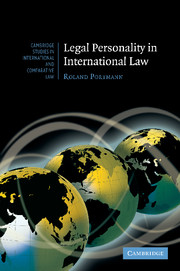Book contents
- Frontmatter
- Contents
- Foreword
- Acknowledgments
- Table of Cases
- List of Abbreviations
- Introduction
- Part I The concept of personality in international law
- Part II The conceptions of personality in international law: their origins and legal manifestations
- 4 Early doctrine and practice
- 5 The states-only conception
- 6 The recognition conception
- 7 The individualistic conception
- 8 The formal conception
- 9 The actor conception
- Part III A framework for personality in international law
- Bibliography
- Index
- Titles in the series
- References
5 - The states-only conception
Published online by Cambridge University Press: 05 October 2010
- Frontmatter
- Contents
- Foreword
- Acknowledgments
- Table of Cases
- List of Abbreviations
- Introduction
- Part I The concept of personality in international law
- Part II The conceptions of personality in international law: their origins and legal manifestations
- 4 Early doctrine and practice
- 5 The states-only conception
- 6 The recognition conception
- 7 The individualistic conception
- 8 The formal conception
- 9 The actor conception
- Part III A framework for personality in international law
- Bibliography
- Index
- Titles in the series
- References
Summary
The states-only conception of international personality restricts the personal scope of international law to relations between states exclusively: only states are international legal persons. Individuals and other entities only fully exist as nationals of a state and are therefore not directly relevant for international law. This conception of international personality was mainly formulated by Heinrich Triepel, Lassa Oppenheim and Dionisio Anzilotti. It is argued that the origins of this conception lie mainly in German public law thought of the later decades of the nineteenth century. It was in the specific German socio-political and legal context that the reduction of international law to relations among states originally arose and that particularly relevant ideas about the position of the individual within a state were advocated. The states-only conception, though never unchallenged, was widely adopted in international law doctrine afterwards. Some of its most important manifestations in legal practice are the Mavrommatis-formula, the Serbian Loans statement regarding state contracts, the ECJ's Van Gend en Loos decision as well as, arguably, the Jurisdiction of Courts of Danzig Advisory Opinion. All of these manifestations, as will be shown, are still relevant for legal issues today. On a more general level, and therefore not explicitly addressed in this section, the states-only conception was encapsulated in the well-known Lotus dictum on international law ‘govern[ing] relations between independent States’.
- Type
- Chapter
- Information
- Legal Personality in International Law , pp. 42 - 79Publisher: Cambridge University PressPrint publication year: 2010

